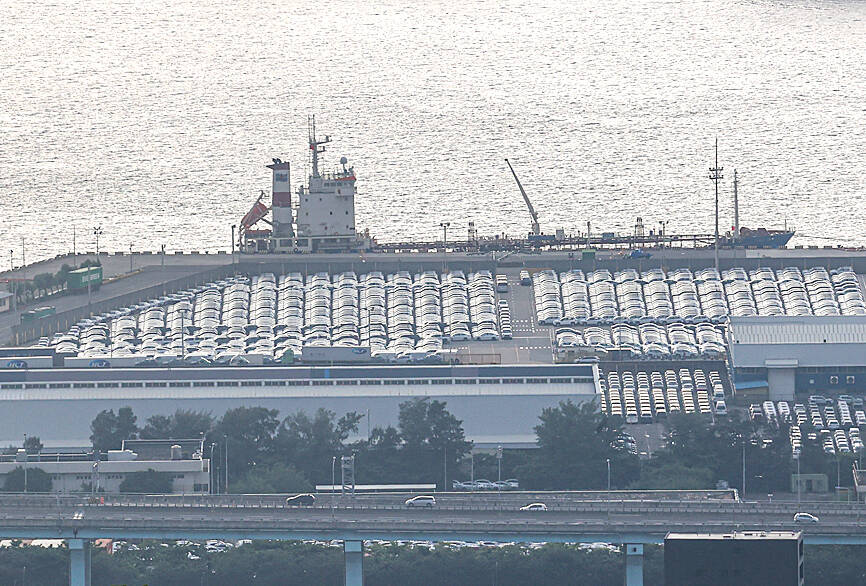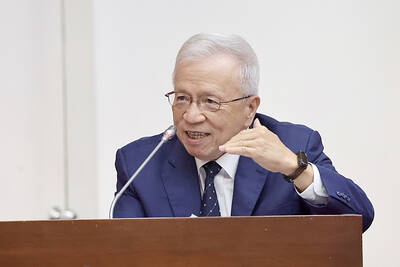The production value of the automobile and parts industry in the second quarter fell 8.32 percent year-on-year to NT$112 billion (US$3.7 billion) as the Taiwan-US trade talks over the tariffs issue heavily weighed on the local car market, the Ministry of Economic Affairs said in a report on Tuesday.
“The auto market is cautious, and consumers are taking a wait-and-see attitude ahead of the outcome of trade negotiations, causing demand to slow down, while some automakers have suspended or reduced production due to equipment upgrades, resulting in a significant decrease in the output value of fuel-powered cars and trucks,” the report said.
“In addition, the order momentum for automotive electrical appliances, automotive lighting units and other parts has weakened,” it said.

Photo: CNA
Two other traditional industries also posted output decreases in the April-to-June quarter, with the chemical materials and fertilizers industry declining 20.26 percent to NT$339.9 billion and the base metals industry down 12.99 percent to NT$355 billion, the report said.
The traditional industries were affected by factors such as the uncertainty of the international economic and trade situation, while some manufacturers reducing production for equipment maintenance also played a role, the ministry said.
In contrast, the electronic components industry posted an annual increase of 25.62 percent in production value to NT$1.91 trillion, led by a 29.24 percent rise in semiconductor output, on strong demand of artificial intelligence (AI) and high-performance computing (HPC) applications, the report said.
The computer and optical products industry also registered 72.95 percent growth in production value to NT$707.8 billion due to robust demand for AI and cloud-based data services, it said.
Meanwhile, the machinery equipment industry posted an output increase of 3.86 percent to NT$237.9 billion, as the semiconductor industry’s active expansion of advanced process production drove demand for semiconductor equipment, machinery components and automated warehousing equipment, it said.
Overall, Taiwan’s manufacturing output in the second quarter rose 11.14 percent year-on-year to NT$5.35 trillion, the sixth consecutive quarter of annual growth, the ministry said.
The outlook for the manufacturing sector remains positive, the ministry said, citing strong demand for emerging technologies such as AI, HPC and cloud-based data services; Taiwan’s leading edge in advanced semiconductor manufacturing processes and its comprehensive supply chain for high-end servers; and the anticipated launches of new consumer electronics in the second half of the year.
However, negative factors such as international trade measures and geopolitical conflicts are expected to disrupt the pace of global economic growth and pose uncertainties for Taiwan’s export-reliant manufacturing sector, it said.

JITTERS: Nexperia has a 20 percent market share for chips powering simpler features such as window controls, and changing supply chains could take years European carmakers are looking into ways to scratch components made with parts from China, spooked by deepening geopolitical spats playing out through chipmaker Nexperia BV and Beijing’s export controls on rare earths. To protect operations from trade ructions, several automakers are pushing major suppliers to find permanent alternatives to Chinese semiconductors, people familiar with the matter said. The industry is considering broader changes to its supply chain to adapt to shifting geopolitics, Europe’s main suppliers lobby CLEPA head Matthias Zink said. “We had some indications already — questions like: ‘How can you supply me without this dependency on China?’” Zink, who also

At least US$50 million for the freedom of an Emirati sheikh: That is the king’s ransom paid two weeks ago to militants linked to al-Qaeda who are pushing to topple the Malian government and impose Islamic law. Alongside a crippling fuel blockade, the Group for the Support of Islam and Muslims (JNIM) has made kidnapping wealthy foreigners for a ransom a pillar of its strategy of “economic jihad.” Its goal: Oust the junta, which has struggled to contain Mali’s decade-long insurgency since taking power following back-to-back coups in 2020 and 2021, by scaring away investors and paralyzing the west African country’s economy.

BUST FEARS: While a KMT legislator asked if an AI bubble could affect Taiwan, the DGBAS minister said the sector appears on track to continue growing The local property market has cooled down moderately following a series of credit control measures designed to contain speculation, the central bank said yesterday, while remaining tight-lipped about potential rule relaxations. Lawmakers in a meeting of the legislature’s Finance Committee voiced concerns to central bank officials that the credit control measures have adversely affected the government’s tax income and small and medium-sized property developers, with limited positive effects. Housing prices have been climbing since 2016, even when the central bank imposed its first set of control measures in 2020, Chinese Nationalist Party (KMT) Legislator Lo Ting-wei (羅廷瑋) said. “Since the second half of

AI BOOST: Next year, the cloud and networking product business is expected to remain a key revenue pillar for the company, Hon Hai chairman Young Liu said Manufacturing giant Hon Hai Precision Industry Co (鴻海精密) yesterday posted its best third-quarter profit in the company’s history, backed by strong demand for artificial intelligence (AI) servers. Net profit expanded 17 percent annually to NT$57.67 billion (US$1.86 billion) from NT$44.36 billion, the company said. On a quarterly basis, net profit soared 30 percent from NT$44.36 billion, it said. Hon Hai, which is Apple Inc’s primary iPhone assembler and makes servers powered by Nvidia Corp’s AI accelerators, said earnings per share expanded to NT$4.15 from NT$3.55 a year earlier and NT$3.19 in the second quarter. Gross margin improved to 6.35 percent,